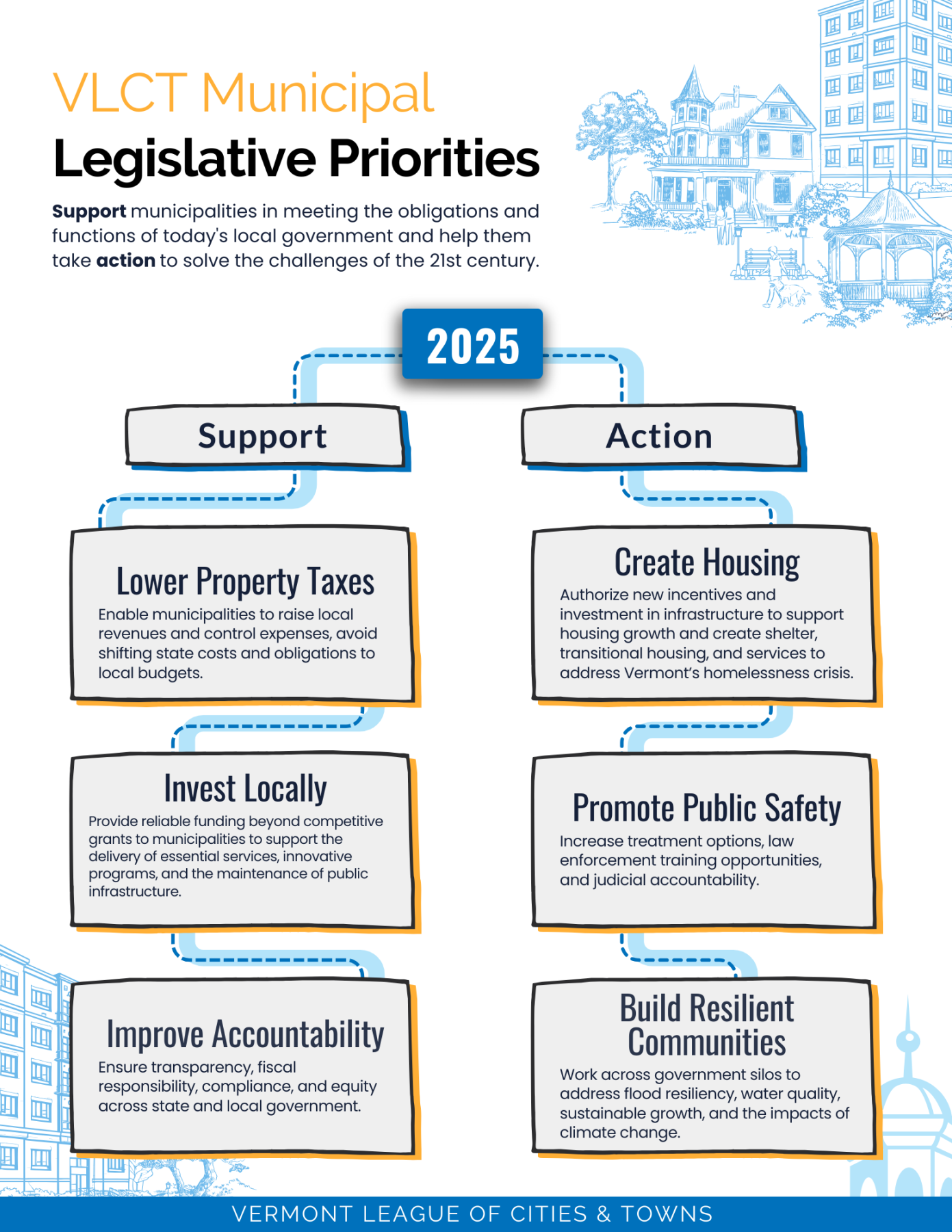
The VLCT Board of Directors has adopted the municipal priorities for the 2025. The Municipal Priorities were drawn from the more comprehensive Municipal Policy in order to guide the VLCT Board of Directors, advocacy staff, and members in effectively advocating for Vermont local governments. In Vermont, local government resources and authority are severely constrained by state law (statutes). Cities and towns need the funding, flexibility, and professional capacity to meet today’s challenges, and VLCT articulates these needs to the Vermont General Assembly (state legislature).
VLCT's Legislative Municipal Priorities for 2025
Lower Property Taxes
Enable municipalities to raise local revenues and control expenses, avoid shifting state costs and obligations to local budgets.
- Modernize the payment formula and schedule for payment in lieu of taxes (PILOT) for state owned property and return the growing fund surplus to municipalities.
- Alleviate local tax burdens by holding municipalities harmless for uncollected state property taxes, reimbursing state mandated tax exemptions, and ensuring no property owner pays less than $0 in state property taxes.
- Base implementation of environmental mitigation efforts on a cost-effectiveness analysis, including those related to the Clean Water Act and the regulation of contaminated urban soils.
- Link voters’ actions to state education tax formula in order to restore local authority in approving school budgets.
- Afford municipalities relief from compliance deadlines and impact fees when corresponding state funding is delayed, eliminated, or made competitive.
- Avoid cost shifting and limit increases to municipal tax burdens in the event of diminished federal funding or challenged state budget cycles.
Create Housing
Authorize new incentives and investment in infrastructure to support housing growth and create shelter, transitional housing, and services to address Vermont’s homelessness crisis
- Authorize local governments to use performance-based contracts and extend tax stabilization to support infrastructure and housing development.
- Increase the threshold for permit appeals of projects located in designated areas.
- Allow for local regulations, fees, and taxes that could prevent the proliferation of Short-term Rentals and Second Homes.
- Reform the General Assistance Hotel/Motel program to ensure equitable and proportionate impact on municipalities and require the state to lead homelessness prevention and response efforts.
Invest Locally
Provide reliable funding beyond competitive grants to municipalities to support the delivery of essential services, innovative programs, and the maintenance of public infrastructure.
- Adequately fund right-sized, efficient public transit services and prioritize the implementation of complete streets.
- Ensure ongoing funding for the Flood Resilient Communities Fund, including relocation and rebuilding of municipal properties.
- Accelerate brownfield clean-up and redevelopment.
- Ensure that funding for the Town Highway Emergency Fund is sufficient to cover municipal costs regardless of a Federal Disaster Declaration.
- Diversify Transportation Fund revenue sources to align with our climate and safety goals and remit a portion of registration fees to the municipality in which the vehicle is registered.
- Share revenue with municipalities supporting cannabis retail and cultivation industries.
Promote Public Safety
Increase treatment options, law enforcement training opportunities, and judicial accountability.
- Increase the availability of on-demand substance use disorder and mental health treatment services and sober living alternatives.
- Establish a default statewide ban on firearms in designated municipal buildings/property, from which a municipality may opt out.
- Increase efforts to disrupt, arrest, and prosecute drug dealers and suppliers.
- Improve the judicial system’s capacity to require accountability for offenders’ actions, sufficiently fund and improve treatment court, and establish the accurate and timely reporting of judicial data.
- Support Fire Departments and Emergency Medical Services in meeting OSHA/VOSHA standards to ensure the viability of volunteer service in rural communities.
- Implement initiatives that reverse the critical shortage of public safety personnel statewide and create new ways to recruit and retain them.
Improve Accountability
Ensure transparency, fiscal responsibility, compliance, and equity across state and local government.
- Strengthen a robust and transparent partnership between state and local government and enable intermunicipal collaboration to tackle multi-jurisdictional issues at scale while maintaining local control.
- Clarify and modernize open meeting law to ensure equity and enable compliance.
- Allow municipalities to employ the prudent fiscal practice of providing for an unrestricted fund balance within the municipal general fund budget.
- Extend to municipal government the same protections from monetary damages and liabilities that the legislature has enacted for the State.
- Assign municipal ethics complaints to the State Ethics Commission and authorize recall elections for local office.
Build Resilient Communities
Work across government silos to address flood resiliency, water quality, sustainable growth, and the impacts of climate change.
- Build resilient infrastructure designed for intended use, which can withstand more extreme weather and meets stormwater management standards.
- Provide municipalities affected by the 2024 floods with local match, tax abatement, and revenue loss funding necessary for recovery.
- Charge the State with the responsibility of managing rivers, streams, and watersheds for resiliency and flood control.
- Ensure local input and control over the siting and permitting of energy projects.
- Provide accessible, low barrier programs for weatherization efforts at scale.
- Reform the 3 Acre Rule General Permit implementation to consider cost, feasibility, and effectiveness in reducing stormwater impacts.